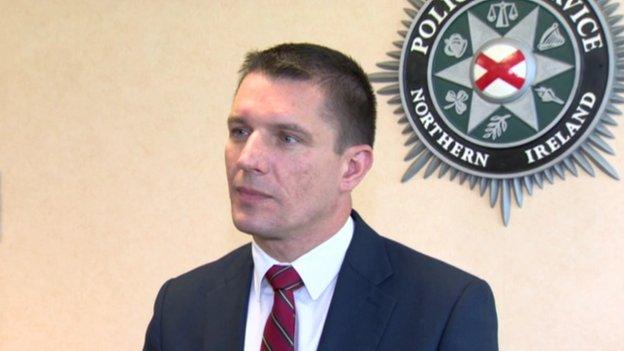Human trafficking: 21 people 'rescued' in Newtownhamilton and Belfast
- Published

Det Ch Insp Douglas Grant, from the PSNI's Serious Crime Branch said all 21 people may have become victims of forced labour or exploitation
Twenty-one people who may be victims of human trafficking have been rescued by police in two separate operations in County Armagh and greater Belfast.
Police said all 21 are from eastern Europe and had come to Northern Ireland for work, but may have become victims of forced labour or exploitation.
Sixteen of them were rescued on Friday when officers searched premises in Newtownhamilton, County Armagh.
In a separate operation in Belfast, five potential victims were identified.
All 21 people are now in the care of police and other agencies.

It is quite an intense and sad piece of work to see human beings bought and sold as commodities.
It is quite challenging for everybody, for the staff involved as well.
Obviously, I can't talk about these specific cases, but in the past, we have supported trafficked women. They are very distressed and mistrustful following their experience in dealing with violence and abuse.
A lot of work has to be done in terms of supporting them and regaining their trust.
One woman left me a very sad note. It said: "I am so damaged, nobody will be able to help me."
She re-trafficked herself.
Marie Brown, Women's Aid

The Newtownhamilton operation focused on workers in the agricultural sector and those rescued are men and women aged between 18 and 45.
They are now being cared for by Migrant Help and Women's Aid.
Det Ch Insp Douglas Grant, from the PSNI's Serious Crime Branch, said: "The first operation was an operation into human trafficking for suspected forced labour.
"On Friday, we conducted a number of searches in the Newtownhamilton area which resulted in PSNI officers identifying 16 potential victims of human trafficking who we believe were being exploited in the agricultural sector.
"The victims are eastern European nationals, we believe they came to Northern Ireland seeking work and were subsequently exploited."
The officer said some of those rescued were "very distressed" and translation difficulties had complicated the investigation.
'Language issues'
"In terms of the number of potential victims, this is one of the largest operations we have mounted in the past year," the officer's statement said.
"Due to the numbers involved, and the challenges posed by language issues, it will take some time to form a clear picture of what exactly has taken place.
"But we are following a number of definite lines of inquiry and our investigation will continue for some time," he added.
The Belfast operation focused on organised crime, and those rescued are believed to have been exploited by criminal gangs, but forced labour is not suspected.
'Evidence'
Both operations have been led by detectives from the PSNI Human Trafficking Unit, but they are being assisted by HM Revenue and Customs, the Gangmasters Licensing Authority and the Health and Safety Executive.
The people who have been rescued will be assessed for referral to the UK Human Trafficking Centre, which is run by the National Crime Agency (NCA).
Det Ch Insp Grant said the PSNI investigation would try to "establish how these people came to Northern Ireland and the arrangements under which they were working".
"Any evidence of illegal activity will be brought before the courts," he added.
Dr Neil Jarman, Queen's University, who researches human trafficking, said the number recovered in the two operations was large.
"These two operations have got 50% of the total number of victims recovered in previous years," he said.
"It is very difficult to have a clear idea of the number of people that might be held in modern day slavery. But the numbers are going up."
He said that, in the past, it had proved challenging to secure prosecutions, partly because of the nature of the crimes and partly because of the fear and potential threat felt by victims.
He said new legislation had been introduced on forced labour in the UK that should have an effect.
Dr Jarman said it was important that various agencies worked together and cooperated on human trafficking.